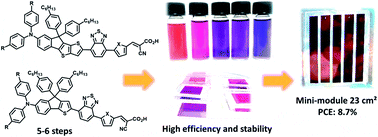Benzothiadiazole-based photosensitizers for efficient and stable dye-sensitized solar cells and 8.7% efficiency semi-transparent mini-modules
We report on the synthesis and structure–properties relationships of five benzothiadiazole-based organic dyes designed for use in Dye-Sensitized Solar Cells (DSSCs). These compounds exhibit hues ranging from pink to violet-blue and demonstrate good Power Conversion Efficiencies (PCEs) ranging from 7.0% to 9.8% when employed as photosensitizers with TiO2 mesoporous electrodes. The combination of two of these dyes following a co-sensitization approach led to a PCE of up to 10.9% with an iodine-based liquid electrolyte. We demonstrate, using charge extraction and transient photo-voltage experiments, that the improvement of the performances with the cocktail of dyes is related to better light absorption and passivation of the TiO2 surface. When the volatile electrolyte is swapped for an ionic-liquid, PCEs over 7.5% are reached and the best solar cells retain 80% of their initial performance after 7000 h of light exposure, according to the accelerated aging test ISOS-L2 (65 °C, AM1.5G, under continuous irradiation at 1000 W m−2). Finally, we report excellent performance in five-cell mini-modules with 14 cm2 active area demonstrating a PCE of 8.7%. This corresponds to a power output of circa 123 mW, ranking among the highest performances for such semi-transparent photovoltaic devices.

Godfroy, M.; Liotier, J.; Mwalukuku, V. M.; Joly, D.; Huaulmé, Q.; Cabau, L.; Aumaitre, C.; Kervella, Y.; Narbey, S.; Oswald, F.; Palomares, E.; González Flores, C. A.; Oskam, G.; Demadrille, R.
Sustain. Energ. Fuels 2021, 5, 144-153
DOI:
10.1039/D0SE01345E

Let's create a brighter future
Join our team to work with renowned researchers, tackle groundbreaking
projects and contribute to meaningful scientific advancements




















